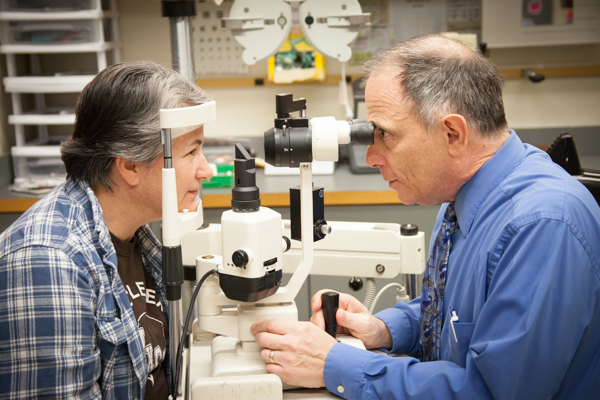Understanding the Different Eye Issues Dealt With by Specialized Eye Treatment Professionals
In the realm of eye treatment, specialized professionals play a vital role in diagnosing and dealing with a large array of eye problems. As we embark on this exploration of the numerous eye conditions dealt with by specialized eye treatment experts, it becomes noticeable that the intricate internet of ocular wellness holds a myriad of remarkable insights waiting to be revealed.
Usual Refractive Errors
Refractive errors are typical visual conditions created by an imperfection in the eye's ability to appropriately focus light, resulting in blurred vision. Astigmatism is identified by an irregularly shaped cornea, resulting in altered or obscured vision at all distances. Presbyopia is an age-related problem where the lens sheds its flexibility, making it challenging to concentrate on close items.
These refractive mistakes can be dealt with through different approaches, including spectacles, get in touch with lenses, or refractive surgical treatment. Eye care professionals play an important role in detecting and taking care of refractive errors to aid people attain more clear vision and boost their top quality of life.
Age-Related Eye Conditions
As individuals age, their eyes may be vulnerable to a range of problems beyond refractive errors that can impact their vision and general eye wellness. Age-related eye problems are common and can substantially affect the quality of life for older adults. One of one of the most prevalent age-related eye conditions is age-related macular degeneration (AMD), an illness that creates main vision loss and can make tasks like analysis and driving difficult. refractive surgeries in al. Cataracts, one more common condition among older individuals, cause clouding of the eye's natural lens, resulting in obscured vision. Glaucoma, characterized by damages to the optic nerve, is additionally more common with age and can cause field of vision loss or loss of sight if left neglected. Furthermore, presbyopia, a problem where the eye's lens loses adaptability, is an all-natural part of aging and brings about problem concentrating on close things. Routine eye tests with specialized eye care professionals are essential for very early discovery and administration of these age-related eye problems to maintain vision and preserve eye health and wellness as people expand older.
Vision-Threatening Diseases
Vision-threatening diseases encompass a variety of significant eye problems that have the prospective to substantially affect a person's sight and general aesthetic feature. These conditions present a threat of long-term vision loss if not promptly diagnosed and dealt with by specialized eye care specialists. Some typical vision-threatening diseases consist of glaucoma, diabetic retinopathy, age-related macular deterioration (AMD), and retinal detachment.
Glaucoma is a team of eye problems that harm the optic nerve, typically due to high intraocular pressure, leading to peripheral vision loss and possible loss of sight if left untreated. AMD is a dynamic condition impacting the macula, leading to main vision loss.
Very early discovery, regular eye tests, and timely intervention are vital in managing vision-threatening diseases to protect sight and maintain lifestyle. Specialized eye treatment professionals play an important function in diagnosing, treating, and managing these conditions to stop permanent vision loss.

Corneal Conditions
Corneal problems include a spectrum of conditions that influence the clear front component of the eye, understood as the cornea. Therapy for corneal disorders varies depending on the details condition yet may include medications, contact lenses, or in severe instances, corneal transplants. Routine eye exams are essential for very early discovery and monitoring of corneal conditions to protect vision and eye health.
Neurological Eye Conditions
Neurological eye conditions entail conditions that affect the link between the eyes and the mind, influencing aesthetic handling and overall eye feature. These problems can show refractive surgeries in al up in various ways, affecting vision, eye motions, and even the control in between the eyes. One usual neurological eye problem is optic neuritis, identified by swelling of the optic nerve resulting in vision loss, shade desaturation, and pain with eye activity.
An additional considerable condition is nystagmus, where the eyes make recurring, unchecked motions, impacting visual skill and deepness perception. In addition, problems like amblyopia, frequently referred to as "careless eye," arise from unusual aesthetic growth in very early youth, leading to lowered vision in one eye.
Neurological eye conditions call for specific care from specialists like neuro-ophthalmologists who have proficiency in both neurology and ophthalmology. Diagnosis frequently includes a detailed eye examination, imaging research studies, and cooperation with neurologists to address the underlying neurological problems impacting the visual system. Treatment methods can consist of drug, vision treatment, or in extreme situations, medical interventions to manage these intricate conditions properly.

Conclusion
To conclude, specialized eye care specialists deal with a large range of eye conditions, including typical refractive errors, age-related eye conditions, vision-threatening conditions, corneal problems, and neurological eye problems - refractive surgeries in al. By recognizing these various problems and seeking proper therapy from eye treatment specialists, individuals can preserve optimal eye health and wellness and vision. It is essential to focus on regular eye evaluations and comply with suggested treatment strategies to maintain and shield one's vision for the future